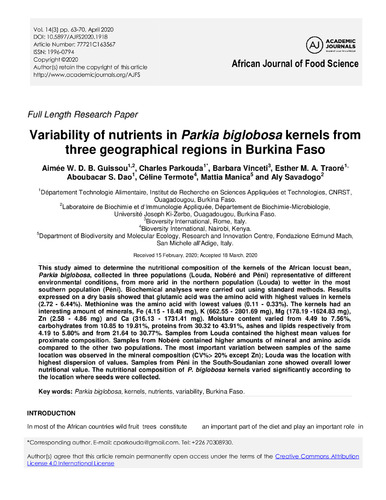Variability of nutrients in Parkia biglobosa kernels from three geographical regions in Burkina Faso
This study aimed to determine the nutritional composition of the kernels of the African locust bean,
Parkia biglobosa, collected in three populations (Louda, Nobéré and Péni) representative of different
environmental conditions, from more arid in the northern population (Louda) to wetter in the most
southern population (Péni). Biochemical analyses were carried out using standard methods. Results
expressed on a dry basis showed that glutamic acid was the amino acid with highest values in kernels
(2.72 - 6.44%). Methionine was the amino acid with lowest values (0.11 - 0.33%). The kernels had an
interesting amount of minerals, Fe (4.15 - 18.48 mg), K (662.55 - 2801.69 mg), Mg (178.19 -1624.83 mg),
Zn (2.58 - 4.86 mg) and Ca (316.13 - 1731.41 mg). Moisture content varied from 4.49 to 7.56%,
carbohydrates from 10.85 to 19.81%, proteins from 30.32 to 43.91%, ashes and lipids respectively from
4.19 to 5.80% and from 21.64 to 30.77%. Samples from Louda contained the highest mean values for
proximate composition. Samples from Nobéré contained higher amounts of mineral and amino acids
compared to the other two populations. The most important variation between samples of the same
location was observed in the mineral composition (CV% 20% except Zn); Louda was the location with
highest dispersion of values. Samples from Péni in the South-Soudanian zone showed overall lower
nutritional value. The nutritional composition of P. biglobosa kernels varied significantly according to
the location where seeds were collected.

